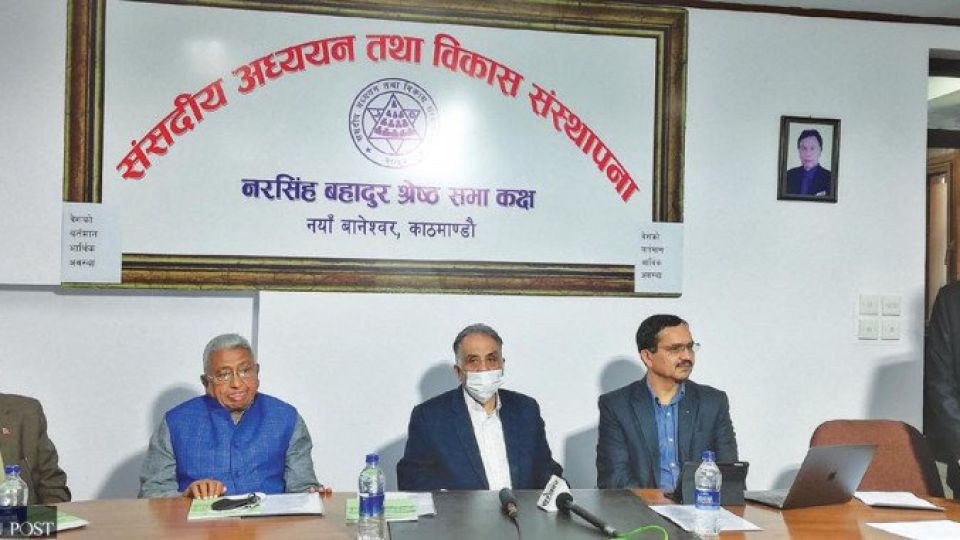March 30, 2023
KATHMANDU – Nepal’s construction sector demand has slowed to a crawl and it could deal a crushing blow to the country’s overall economic performance, Nepal Rastra Bank Governor Maha Prasad Adhikari said on Tuesday.
In the first quarter of the current fiscal year, mining and quarrying and the construction sector suffered the most, posting negative growths of 29.2 percent and 24 percent, respectively.
The share of the construction sector to the country’s gross domestic product is more than 6 percent.
Adhikari said the slowed demand in cement and steel could result in lower economic growth. “The targeted 5 percent growth may not be achieved this fiscal year ending mid-July,” said Adhikari, addressing a programme entitled ‘Current Economic Situation of the Country’, organised by the Foundation for Parliamentary Studies and Development.
Nepal’s economic growth was 5.84 percent in the last fiscal year.
The apex bank’s governor, however, said Nepal’s key economic indicators have improved and are no longer adding to the fiscal deficit.
Fiscal deficits are negative balances that arise whenever a government spends more money than it brings in during the fiscal year.
The inflation too, is being estimated to remain on the higher side.
The monetary policy had targeted to keep inflation within 7 percent.
“But it is still above that target,” Adhikari said. “It is expected that inflation will be between 7-8 percent until mid-July,” said Adhikari.
The external sector’s performance is heading in a positive direction, he added.
“The external sector almost got derailed in the last fiscal year and we have since come out of it,” Adhikari said.
The import-export and the overall trade deficit have shrunk. The trade deficit declined by 18.7 percent in the first seven months of the current fiscal year, he added.
The remittance earning has grown 27.5 percent, which has helped stabilise the external sector. Nepal has been receiving remittances of more than Rs100 billion per month.
“As the number of migrant workers is increasing, we expect that the remittances will increase,” Adhikari said.
“As a result of increased remittances, the banks’ liquidity has now crossed Rs400 billion,” he added.
During the last fiscal year, the central bank had injected around Rs350 billion into the market.
The tourist arrival has also reached pre-Covid era levels and the room occupancies are also improving, which is positive, said Adhikari.
The interest rate fluctuated due to the imbalance in demand and supply, he noted.
“The banks, to increase liquidity, offered higher interest rates for deposits,” Adhikari said.
The interest rates are declining gradually as the base rate has come to 11 percent, the average loan interest rate is at 13 percent and the average deposit interest rate is around 9 percent.
“The easing liquidity has been reducing the interest rate in the past few months. The indications until now show that interest rates will not go up. In fact, it is on a declining trend,” he said.
Adhikari said that the revenue collection of the government has declined due to which it is becoming difficult to maintain the current expenditure for the government.
“It is challenging to increase the revenue this year as the private sector income has declined, and corporate tax too, is on the decline. There is no sign that revenue from imports will increase this year,” said Adhikari.
Achyut Wagle, a professor at Kathmandu University, said the government’s current expenditure is Rs600 billion and it has been collecting revenue for the same amount.
“The government is struggling to provide salaries from the current expenditure and this is a rare event in its history.”
Wagle said that there is a need for a policy response to resolve the ongoing economic problem.
“There is a need for legal and structural policy reform,” he said.
Govinda Raj Pokhrel, former vice chairman of the National Planning Commission, said Nepal’s financial governance has become weak—in both the private and public sectors.
“The country’s economic situation is not good and the reasons for that are many,” Pokhrel said.
Remittances have become a major source of income which is not sustainable, he said.
With the country’s trade deficit rising and investments slowing to a crawl, the banks’ and cooperatives’ investments in the unproductive sectors is growing,” Pokhrel noted.


